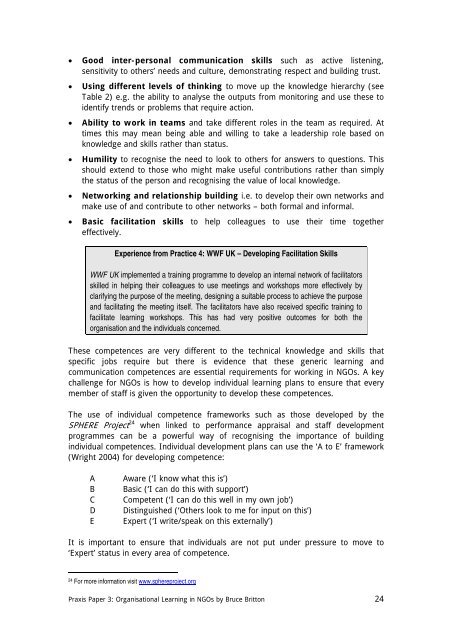Organisational Learning Discussion Paper - Are you looking for one ...
Organisational Learning Discussion Paper - Are you looking for one ...
Organisational Learning Discussion Paper - Are you looking for one ...
Create successful ePaper yourself
Turn your PDF publications into a flip-book with our unique Google optimized e-Paper software.
• Good inter-personal communication skills such as active listening,<br />
sensitivity to others’ needs and culture, demonstrating respect and building trust.<br />
• Using different levels of thinking to move up the knowledge hierarchy (see<br />
Table 2) e.g. the ability to analyse the outputs from monitoring and use these to<br />
identify trends or problems that require action.<br />
• Ability to work in teams and take different roles in the team as required. At<br />
times this may mean being able and willing to take a leadership role based on<br />
knowledge and skills rather than status.<br />
• Humility to recognise the need to look to others <strong>for</strong> answers to questions. This<br />
should extend to those who might make useful contributions rather than simply<br />
the status of the person and recognising the value of local knowledge.<br />
• Networking and relationship building i.e. to develop their own networks and<br />
make use of and contribute to other networks – both <strong>for</strong>mal and in<strong>for</strong>mal.<br />
• Basic facilitation skills to help colleagues to use their time together<br />
effectively.<br />
Experience from Practice 4: WWF UK – Developing Facilitation Skills<br />
WWF UK implemented a training programme to develop an internal network of facilitators<br />
skilled in helping their colleagues to use meetings and workshops more effectively by<br />
clarifying the purpose of the meeting, designing a suitable process to achieve the purpose<br />
and facilitating the meeting itself. The facilitators have also received specific training to<br />
facilitate learning workshops. This has had very positive outcomes <strong>for</strong> both the<br />
organisation and the individuals concerned.<br />
These competences are very different to the technical knowledge and skills that<br />
specific jobs require but there is evidence that these generic learning and<br />
communication competences are essential requirements <strong>for</strong> working in NGOs. A key<br />
challenge <strong>for</strong> NGOs is how to develop individual learning plans to ensure that every<br />
member of staff is given the opportunity to develop these competences.<br />
The use of individual competence frameworks such as those developed by the<br />
SPHERE Project 24 when linked to per<strong>for</strong>mance appraisal and staff development<br />
programmes can be a powerful way of recognising the importance of building<br />
individual competences. Individual development plans can use the ‘A to E’ framework<br />
(Wright 2004) <strong>for</strong> developing competence:<br />
A Aware (‘I know what this is’)<br />
B Basic (‘I can do this with support’)<br />
C Competent (‘I can do this well in my own job’)<br />
D Distinguished (‘Others look to me <strong>for</strong> input on this’)<br />
E Expert (‘I write/speak on this externally’)<br />
It is important to ensure that individuals are not put under pressure to move to<br />
‘Expert’ status in every area of competence.<br />
24 For more in<strong>for</strong>mation visit www.sphereproject.org<br />
Praxis <strong>Paper</strong> 3: <strong>Organisational</strong> <strong>Learning</strong> in NGOs by Bruce Britton<br />
24
















![CynefinFramework final [Read-Only]](https://img.yumpu.com/19017304/1/190x135/cynefinframework-final-read-only.jpg?quality=85)